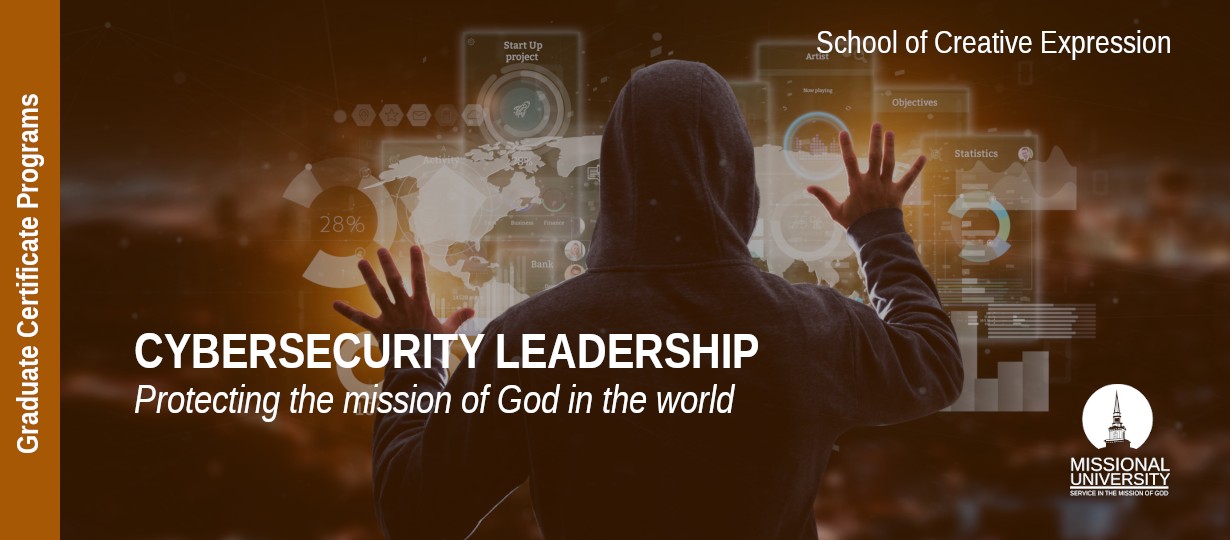
Online Graduate Certificate in
Cybersecurity Leadership
⚜ Rarely Offered in Christian Universities, Bible Colleges or Seminaries
Expand Your Missional Service Today!
REQUEST INFORMATION
Ready to learn more about the
Graduate Certificate in
Cybersecurity Leadership?
LEARN MORE NOW
Through the Graduate Certificate in Cybersecurity Leadership, students are equipped to prevent, protect against, mitigate, respond to and recover from incidents arising from all cyber hazards, ensuring the resilience and continuity of the digital assets of faith-based organizations and organizations in the private and public sectors. Courses in the program inform the student's situational awareness, preparedness planning and security operations, and sound decision-making that affect the operations, security and resources of their organizations.
Mission entities, nonprofits & NGOs, schools, churches and church groups, like any other collection of people, can benefit from the prevention and mitigation of the spread of malware, ransomware infections, website defacements, and email scams. With more than 2,500,000,000,000,000,000 bytes of data added to the internet each day, the need for online security experts continues to grow. Today, more than ever, organizations must protect their data -- and those that are ready to lead cybersecurity efforts are needed.
Program Features
-
Integrated practicums allow you to gain valuable real-world experience
-
Learn from academic practitioners from around the world
-
Credits earned in this certificate program can apply to a Missional University Master's degree program
Course Effort
Course Length
Credits Required
Program Cost
What Will I Study?
We offer the most comprehensive approach to cybersecurity in the mission of God.
Analyzes how God has spoken to and through mankind through word, deed, nature, and natural objects. Comparing and contrasting the Biblical evidence, historical examples, communication theory, and missiological concerns, the student will develop both a theology and strategies for communicating the Good News in a variety of contexts.
Students will examine processes and technologies in IT security and operations with implementation of IT management and operations. Topics for this course will include: development, evaluation of IT processes, ethical and strategic planning and procedures, and integrating cybersecurity concepts and theories, etc.
What policies, plans and programs are necessary for a secure IT system? This course covers the purpose, application and use of cybersecurity principles, and best practices in faith based organizations. Projects include developing security policies and strategies and assessing cybersecurity programs
What are specific concerns and issues with cybersecurity and faith-based organizations and NGOs? Students will develop and evaluate advanced concepts in cybersecurity and information assurance. Areas of focus include security policies, models, integrity, and availability of information. Students will evaluate case studies and complete projects designed to prevent, detect and recover from the loss of information, cryptography, vulnerability scanning, and web services for preserving information security.
What are the most effective emerging technologies available for cybersecurity? This course will evaluate emerging technologies in the cybersecurity field specifically examining usefulness and value as it relates to the organization. Students will also develop implementation strategies for emerging technologies related to faith-based organizations.
This course will explore security challenges and threats and how to protect systems against attacks. The topics for this course will include: system administrators and leaders supporting organizational goals, security threats, today’s information systems problems and solutions, and secure systems and networks.
Students explore the foundations of information security audit and digital forensics while applying common theories with modern technologies and principles. Topics for this course include: security structures and control, security policies and models, attacking methods and security, security and digital forensics theories, legal and ethical issues related to computer security, corporate and government securities, and IT auditing.
Additional Optional Courses
This course provides an overview of network design technologies. Topics include network design, implementation, maintenance, optimization, and troubleshooting. Students will utilize a variety of networking tools, operating systems, and hardware platforms and protocols.
Students will explore the foundations, processes, and practices of IT management within business and organizations. Topics covered in this course will include: IT foundation and management, social and socio-technical IT management, project management, and ethical IT practices, etc.
What is your responsibility to the organization and others in relation to ethical behavior? Students will discuss and evaluate ethical concepts related to personal and organizational decision making in the use of information systems in faith-based organizations. Students will examine ethical issues raised by current and evolving technologies and analyze risk and decision options. Student will complete case studies related to ethical situations and the desired outcome. Students will also evaluate the impact of unethical behavior in the workplace.
This course will identify and focus attention on providing knowledge of internet usage in people’s lives and the influence this influences our personal lives. Students will learn about a digital life and will acknowledge issues such as cyberbullying, managing their identity online, as well as mental health issues associated with internet use. The internet has become an integral part of our lives, with large numbers of people spending an average of 20 hours online per week. This is likely to grow with the advent of smart phones which provide 'internet in your pocket'. This shift towards online activities has led many to question whether it is having a positive or negative effect on our wellbeing. Particularly for the last two generations who have never not known a digital life and have had to navigate issues such as cyberbullying, managing their identity online and mental health issues associated with internet use. This course is suitable for anyone who has pondered the effect the internet is having on us, good or bad? In particular those interested in the psychological impact leading a digital life has on young people.
When Can I Get Started?
We offer multiple start dates each year to give you flexibility in your education, life and work schedules.
JANUARY
MARCH
MAY
AUGUST
OCTOBER
A Career in Communicating Creatively
Is this Your Mission?
Application Security Administrator, Cloud Security Architect, Counterespionage Analyst, Cyber Insurance Policy Specialist, Cyber Operations Specialist, Data Security Analyst, Information Assurance Analyst, Information Security Analyst, IT Security Architect, Network Security Administrator, Security Analyst, Security Auditor, Security Consultant, Security Operations Center (SOC) Analyst, IT Security Manager/Director, Security Administrator, Security Operations Center (SOC) Manager, Chief Information Security Officer (CISO)
Request Information Now
How Much Will it Cost?
We offer tuition based upon country of residence. According to the Human Development Index, all countries around the world fall into one of four categories:
-
(Tier 1) - Very High Human Development
-
(Tier 2) High Human Development
-
(Tier 3) Medium Human Development
-
(Tier 4) Low Human Development
Our tiered global tuition makes higher education affordable for everyone world wide.

TIER COUNTRIES
100% Tuition
$395
per credit hour
3 credit course
$1185

TIER COUNTRIES
80% Tuition
$316
per credit hour
3 credit course
$948

TIER COUNTRIES
60% Tuition
$237
per credit hour
3 credit course
$711

TIER COUNTRIES
40% Tuition
$158
per credit hour
3 credit course
$474
Tiered tuition based on country of origin and scholarships available. Find your country of residence here for more information.
Tuition may be further reduced by participating in the Sponsorship Program.
